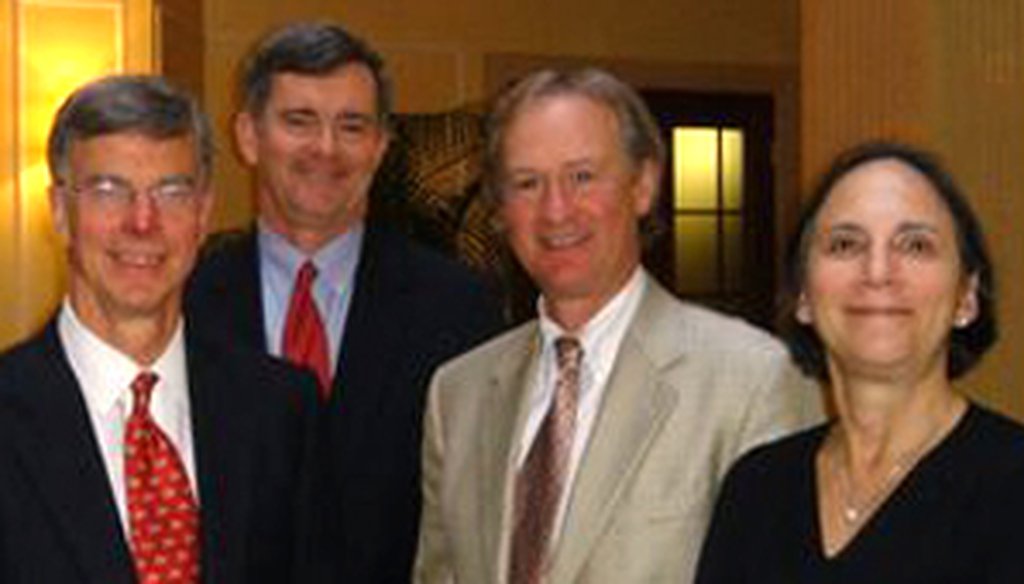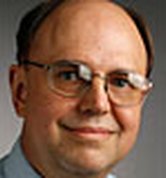Stand up for the facts!
Our only agenda is to publish the truth so you can be an informed participant in democracy.
We need your help.
I would like to contribute

Then-U.S. Ambassador William Taylor, Akhmetov lawyer Mark MacDougall, Lincoln Chafee and Toby Trister Gati, former U.S. Assistant Secretary of State for Intelligence and Research, in Ukraine in 2007 / Photo courtesty Mark MacDougall
Given Lincoln Chafee's record of being willing to buck the system and the Chafee family's reputation, Rhode Islanders were jarred to hear the independent gubernatorial candidate being accused of consorting with someone who might have ties to organized crime.
But on Oct. 7, GoLocalProv, a five-month-old local news website, published the headline "International Intrigue: Chafee Consults to Controversial Ukrainian Billionaire." It reported that its investigation had revealed that Chafee earned "as much as $100,000" from a three-year-old foundation established by "a Ukrainian billionaire with widely reported ties to organized crime."
The foundation is The Foundation for Effective Governance, established "to facilitate systematic dialogue between experts, government, business, civil society, organizations, and mass media." Its website says the foundation is the private initiative of Rinat Akhmetov, who established it with a $50 million gift, designed to cover five years.
Akhmetov is the billionaire son of a coal miner whose empire includes steel, iron and coal operations. Forbes.com regularly includes him in its list of the world's richest people. In the 2010 ranking, he was pegged at number 148, with an estimated net worth of $5.2 billion.
The GoLocalProv story
To back up the suggestion of an organized crime link, GoLocalProv cited -- and offered links to -- English language versions of two stories, both from 2005, one from Kiev and the other from Russia.
One, at Kommersant.com, reported that Akhmetov had been called in for questioning by Ukraine's Interior Ministry. The ministry did not give a reason. That story quotes Sergey Kornicha, head of the ministry's Economic Crimes Department as saying, "I am deeply convinced that Akhmetov is the real head of an organized crime group," a quote repeated by GoLocalProv.
Omitted from the GoLocalProv account is information in the same paragraph reporting that Kornicha's boss, Interior Minister Yury Lutsenko, had said he personally had not seen any evidence that Akhmetov was implicated in any criminal offenses. The minister had said that Kornicha was promising that he would prove his case or apologize to Akhmetov. Five years later, we could find no evidence that either has occurred.
The second story is on the website of the Kyiv Post, also from July 2005, which offers the even more inflammatory suggestion -- but not directly mentioned by GoLocalProv -- that Akhmetov was suspected of being involved in the 1988 shooting of Serhiy "Botsman" Chernyshev.
That story also reports that Akhmetov's Washington law firm, Akin Gump Strauss Hauer & Feld, was asserting that it had a sworn statement from Botsman insisting that Akhmetov had no involvement in the shooting. The firm also said that Botsman had given the same assurance to prosecutors.
The Kyiv Post story cites political analyst Vadym Karasiov as saying that it is no secret that Ukraine's elite has, in the past, been closely tied to organized crime groups. It quotes Karasiov as predicting that Akhmetov would likely be arrested in early 2006. We were unable to find any evidence that Akhmetov was ever arrested for anything.
GoLocalProv also said that "Akhmetov was named as a suspect in a murder investigation," citing an article about former presidential candidate John McCain in The Nation. But that article offers no details and GoLocalProv offers none.
In the Kyiv Post article, Akhmetov's law firm suggested that the government was pursuing Akhmetov because he had been an active supporter of the previous Ukrainian president, Viktor Yanukovych.
The 2005 allegations came after Yanukovych was overthrown as part of the so-called "Orange Revolution," which began in November 2004. When officials tried to question Akhmetov as part of a murder investigation, he was out of the country. When Yanukovych's party regained power in 2006, Akhmetov returned to Ukraine, according to the article in The Nation, which mentions Akhmetov in passing.
Akhmetov was then elected to the Ukrainian parliament and continues to serve there.
The billionaire, now 44, has not taken crime allegations lightly. In 2008, a London court awarded him $100,000 after he objected to stories in the Ukrainian paper Obozrevatel, according to a report from the Organized Crime and Corruption Reporting Project, at ReportingProject.net. In January 2010, after the French daily newspaper Le Figaro described him as "a bandit in the past," he got a retraction.
Cianci picks up the story
After GoLocalProv released its story, its media partner, WPRO-630 radio, gave it wider distribution by airing an interview with Taras Kuzio, a visiting fellow at the Johns Hopkins University School of Advanced International Studies in Washington, D.C., and editor of the Ukraine Analyst newsletter.
Kuzio told former Providence mayor Vincent "Buddy" Cianci, now a WPRO talk show host, that Akhmetov hails from Donetsk, a large industrial town in Eastern Ukraine. "Donetsk was basically the wild east in the 1990s and many people who were involved in so-called business were also involved in corruption and organized crime," Kuzio said.
WPRO's online summary of Kuzio's comment says, in part: "Mr. Kuzio described Rinat Akhmetov as Ukraine's Tony Soprano." (Kuzio, in the interview, referred to the fictional crime boss twice.)
Kuzio, a critic of the current Ukrainian leadership, which Akhmetov supports, said in a telephone interview with PolitiFact Rhode Island that there is no solid proof that Akhmetov is a mobster. He claimed that there's no proof because the Ukrainian system is so corrupt and all the witnesses are dead.
He said the rich businessmen in the country are either former bureaucrats who used their connections or former mobsters who used muscle. Akhmetov wasn't a bureaucrat, so people assume he became wealthy because he was involved in organized crime.
But that doesn't make it true.
Another view from Ukraine
For another perspective, we called Brian Mefford, who spent 10 years in Ukraine working for a project funded by the United States Agency for International Development, and is now a political consultant there.
He said the probes of Akhmetov never went anywhere.
In a telephone interview, he agreed that in the 1990s "all the former Soviet Union was sort of the Wild East. A lot of fortunes were made overnight and (Akhmetov) was in the right place at the right time to capitalize on that."
Mefford said the laws in Ukraine "are archaic and they create a system where everyone is in violation of the law, so you could find something bad to say about every single businessman in the country because the laws don't create an environment where you can operate in an openly Western manner. So I think everybody has questions about where people in this country make money."
"There's a saying in the Ukraine for these situations," he said, referring to the millionaires of the region. "Nobody knows how they got the first million. But the second million they can explain. How did Akhmetov get his first million? Nobody knows. But I don't think anybody knows for any businessman here in this country. But his business now is operating above board. It's a well-known, respected business employing thousands of people across the country."
So while some people may suspect Akhmetov of being involved in organized crime, there is no evidence to back that up.
Chafee's involvement
Chafee, who says he wants to fight corruption and refuses to go on WPRO during the time slot occupied by Cianci because of Cianci's felony convictions and behavior while mayor, went on WPRO's John DePetro program to explain that he was invited to join the foundation in 2007. At the time, he was working for The Watson Institute for International Studies at Brown University.
"I received a phone call from a Washington law firm and they were recruiting individuals to advise the Ukraine on their emerging economy from the Soviet era," he said.
Chafee said he asked questions about the job but was reassured by the fact that the board included other distinguished people, including Kim Campbell, Canada's first female prime minister; Frances Cairncross, rector of Oxford University's Exeter College and a Brown University graduate; and Gyorgy Suranyi, a former president of the National Bank of Hungary.
"These are all very, very distinguished individuals," Chafee said.
Mark MacDougall is the lawyer who contacted Chafee. He said the former Senator had lots of questions and went to Ukraine before agreeing to serve on the Foundation's board. "He asked me about Mr. Akhmetov and where his money came from," said MacDougall. But his chief concerns were about the foundation. "He wanted to make sure his good name wasn't being misused."
"Ukraine is thought to be an ongoing laboratory in how democratic institutions develop and I think [Chafee] was very attracted to that," said MacDougall. "He was never hired as a consultant."
Chafee, in an interview with PolitiFact Rhode Island, recalled MacDougall saying that Akhmetov had a reputation in Ukraine. "He pretty much shared all the rumors with me. But he said they're unsubstantiated, and you can take them as you wish."
Chafee said he can understand the rumors. People ask, "'How did it happen so fast, from state-owned businesses going into privately owned? How did that happen?' Those were the questions I had," he told DePetro.
For as much as $100,000 a year, "We travel throughout the Ukraine to learn about the economy and give our best advice we can," Chafee told DePetro. He acknowledged that it's a lucrative position and said he could understand why people are suspicious of Akhmetov because he controlled major industries once owned by the state.
Chafee also told WPRO that he met Akhmetov "very briefly" on one occasion. When we interviewed Chafee, he said he met Akhmetov twice. The first time was when "We just said 'Hi'" and the second was in the past year when Akhmetov hosted an informal luncheon for the foundation's board and they discussed issues involving Ukraine.
Chafee said he has never seen any evidence of impropriety at the foundation and would have resigned if he did. "We're not taking political sides or giving any kind of varnished advice, and I would not participate if I wasn't comfortable with any kind of contribution I was making."
Akhmetov checks his own background
In 2005, Akhmetov, sensitive to the allegations of criminal activity swirling around him and eager to do business in other countries, hired Kroll Associates, an investigations firm in London, to look into the billionaire's background.
The probe -- for which Kroll insisted on being paid in advance to avoid pressure to reach a specific conclusion -- took about six months and included interviews with scores of government officials, police contacts and Akhmetov associates, along with records kept by the former Soviet Union to make sure the Ukrainian records hadn't been altered, according to Omer Erginsoy, a senior managing director who led the investigation.
The resulting report is shown to companies seeking to do business with Akhmetov's or one of his companies.
"We couldn't find any basis for supporting the [criminal] allegations," Erginsoy told us. They all seemed to be cases of "kompromat," a Russian word for an attempt to compromise a political or business rival, he said. "You try to discredit the guy by coming up with some supposed fact, you can embellish on and place it in the public domain of the media. It goes viral and it gets quoted, and it's even easier now, with the Internet."
Such allegations can gain traction because doing business in Ukraine could be rough in the 1980s and '90s. There were, for example, murders involving rival regional clans of traders who competed to supply goods to various businesses as the old Soviet system dissolved. "It became inevitable that these successful guys, each and every one of them, were variously accused of having ties to criminal organization in the period," Erginsoy said.
Akhmetov was a trader, but he didn't remain one, said Erginsoy. "Rather than just supplying goods to these industrial companies that were really faltering, he decided to buy these debt-ridden companies from the state and turned them around. He was one of a handful of guys who had a vision of getting out of the informal economy and owning these assets, developing a real asset base and turning it into a proper company."
MacDougall said Chafee was shown a copy of the 49-page report, but Chafee said he doesn't remember seeing it.
(MacDougall's firm allowed us to read the report. But they would not allow us to copy it. Because we can't share it with our readers, we are not quoting from it here.)
Ambassador urged Chafee's involvement
Some may be suspicious of a report about yourself that you pay for, even if you pay for it in advance from a respected investigations firm.
So we spoke with William B. Taylor Jr., U.S. ambassador to Ukraine from 2006 to 2009.
Taylor was at the initial meeting in Ukraine where Chafee was deciding whether to join the foundation.
"Everybody in Ukraine has a history, but we know more about some than others," said Taylor, now a vice president at the United Institute of Peace in Washington.
"There have been a lot of rumors and unsubstantiated claims about (Akhmetov's) background. But the embassy has done some checking and other United States government agencies back in Washington have done some checking," he said. "While there are a lot of press stories, we had nothing to indicate that it would be a problem for people to be dealing with Mr. Akhmetov. Not just Senator Chafee, but others as well."
Taylor said he met with Akhmetov many times and "he saw that if the country was going in a direction of more openness and transparency in business dealings, it would be better for individual companies like his."
Taylor said he advised Chafee and others about becoming involved in the foundation.
"I told them this foundation [Akhmetov] was putting together, near as we could tell, would mean good things for the country," said Taylor. With "the benefit of advice and guidance from internationally known and respected people like Senator Chafee and others, they could do some good things for the country."
Extraordinary claim, inferior evidence
We contacted the cofounder of GoLocalProv, Josh Fenton, to inquire about the story. He asked us to email our questions. We did. That was Wednesday afternoon. Neither he nor his staff has given us any answers.
We decided not to apply the Truth-O-Meter to this story because while the careful wording of the GoLocalProv headline may be technically accurate, it became clear to us when we probed deeper that key elements of the story are false or unproven.
GoLocalProv offered no evidence that Chafee is paid to directly consult with Akhmetov. He is paid to advise a foundation created by Akhmetov to improve conditions in Ukraine.
As for Akhmetov's "widely reported ties to organized crime," we're reminded of the fact that it can be very difficult to prove a negative. After all, how would you prove to someone that you're not involved with organized crime?
In the end, we've seen no convincing evidence of such a link. As far as we could tell, Rinat Akhmetov has never been indicted or convicted of any crime. We couldn't find any reference of even a minor arrest.
All we found were suspicions, suggestions, innuendo, and conspiracy theories circulating in the rough-and-tumble world of an emerging Ukrainian democracy.
In the end, what the GoLocalProv story is stating is that Chafee is involved with a mobster.
That's an extraordinary claim, given Chafee's reputation.
Astronomer Carl Sagan used to say that "extraordinary claims require extraordinary evidence."
In this case, the evidence doesn't even rise to the level of the ordinary.
Our Sources
GoLocalProv.com, "International Intrigue: Chafee Consults to Controversial Ukrainian Billionaire," Oct. 7, 2010, accessed Oct. 7, 2010
Website, Foundation for Effective Governance, www.feg.org.ua/en, accessed Oct. 12, 2010
Forbes.com, "The World's Billionaires, #148, Rinat Akhmetov," March 10, 2010, accessed Oct. 14, 2010
Kommersant.com, "Rinat Akhmetov Called in to Give Unknown Evidence," July 14, 2005, accessed Oct. 13, 2010
KyivPost.com, "Akhmetov tagged as suspect in attempted murder case," July 21, 2005, accessed Oct. 14, 2010
TheNation.com, "McCain's Kremlin Ties," Oct. 20, 2008, accessed Oct. 14, 2010
ReportingProject.net, Organized Crime and Corruption Reporting Project, "OC prosecutions rarely successful in Ukraine," Nov. 21, 2008, accessed Oct. 14, 2010
MIGnews.com.ua, "French newspaper issues apology to businessman Akhmetov," Jan. 29, 2010, accessed Oct. 14, 2010
KyivPost.com, "French newspaper issues apology to Ukrainian businessman Akhmetov for false report," Jan. 29,2010, accessed Oct. 20, 2010
http://www.kyivpost.com/news/nation/detail/58237/
630WPRO.com, "The Buddy Cianci Show: Taras Kuzio," accessed Oct. 14, 2010
630WPRO.com, "John DePetro: Lincoln Chafee," Oct. 14, 2010, accessed Oct. 14, 2010
GoLocalProv.com, "Chafee Speaks Out on Ukrainian Connection," Oct. 14, 2010, accessed Oct. 14, 2010
Interview, Brian Mefford, Ukrainian political consultant, Oct. 18, 2010
Interview, Taras Kuzio, visiting fellow, School for Transatlantic Relations, Johns Hopkins University, Washington, D.C., Oct. 19, 2010
Interview, Lincoln Chafee, Oct. 19, 2010
Interview, Mark MacDougall, lawyer and spokesman for Rinat Akhmetov, Akin Gump Strauss Hauer & Feld, Oct. 19, 2010
Interview, William B. Taylor Jr., former U.S. ambassador to Ukraine (2006-2009) and current vice president of the Center for Post-Conflict Peace and Stability Operations, United Institute of Peace, Oct. 20, 2010
Interview, Omer Erginsoy, senior managing director, Kroll Associates, Oct. 21, 2010






























